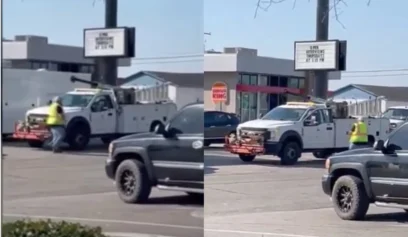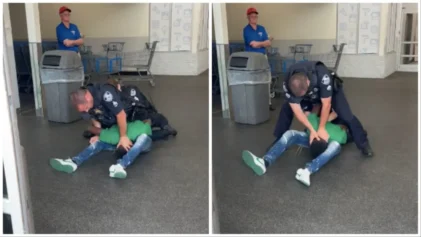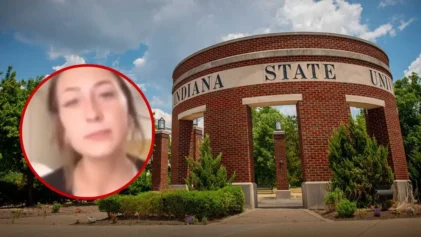This morning, civil rights icon, former Atlanta mayor and former UN ambassador Andrew Young joined “Meet the Press,” telling moderator Chuck Todd that President Trump is “still politicking and thinking nationally, as a nationalist” and that he “made a mistake in thinking that living was easy and it just is not.”
Young also spoke to the controversy of removing Confederate monuments and the associated costs, especially in Georgia.
Video and transcript below provided courtesy of NBC NEWS’ “MEET THE PRESS WITH CHUCK TODD.”
CHUCK TODD: And joining me now is one of the pioneers of the Civil Rights Movement: former UN ambassador, former mayor of Atlanta, former member of Congress Andy Young. Ambassador Young, welcome back to Meet the Press, sir.
ANDREW YOUNG: Thank you very much.
CHUCK TODD: Put this week in context.
ANDREW YOUNG: Well, it’s a week of misunderstandings. We originally sought to redeem the soul of America from the triple evils of race, war and poverty. Most of the issues that we’re dealing with now are related to poverty. But we still want to put everything in a racial context. The problem with the – and the reason I feel uncomfortable condemning the Klan types is – they are almost the poorest of the poor. They are the forgotten Americans. And, um, they have been used and abused and neglected. Instead of giving them affordable health care, they give them black lung jobs, and they’re happy. And that just doesn’t make sense in today’s world. And they see progress in the black community and on television and everywhere and they don’t share it. Now it’s not our fault. We’ve had a struggle from slavery. But black – while they call themselves militants, but they’re not militants, they’re chicken – we never tried to take advantage of anybody else. Our job was not to put down white people. Our job was to lift everybody up together. To come – so that we would learn to live together as brothers and sisters rather than perish together as fools. And that’s been the way I have done it. And everything – as Congress, at the UN, as mayor for eight years. But all the way back in the early sixties, when we were marching with no support and no vote protection and, actually in St. Augustine in ’64, the Klan was deputized by the sheriff and given license to beat us up. And – people still insisted on marching down there every night. And then the Saturday when the Klan wanted to march in the black community, I was a little nervous. But when they marched down spontaneously, the same people that had been beaten, sang “I love everybody, I love everybody in my heart.” And I think the juxtaposition of the violence and the hostility of the Klan and the spirituality and forgiveness of the black community, was the thing that probably broke the filibuster in 1964 and, and gave us the Civil Rights Bill, which offered us a significant number of protections – not everything; we didn’t make everything right – but the answer is to continue to make everything better for everybody.
CHUCK TODD: It feels like we’re in a moment where we’re stuck and we’re stuck for a lot of reasons. And the, and the president – you have, some have even said, there’s a growing cabal of folks who believe he has already lost his moral authority to be a healer in all of this, to help with reconciliation in all of this because of what he did on Tuesday. You have a relationship with him, with the president, off and on.
ANDREW YOUNG: Not really.
CHUCK TODD: Fair enough. But you take his calls. If he calls, you take his calls. If he called you this week, what would you tell him. How would you tell him to fix this?
ANDREW YOUNG: I don’t know what I would say because I think he’s caught in a trap. I don’t think there are any easy answers.
CHUCK TODD: What’s the trap?
ANDREW YOUNG: The trap is that he’s still politicking and thinking nationally, as a nationalist, and so is almost everybody else, including those who are trying to think back and blame it on the Civil War, which was hundreds of years ago. But the problem we have is that we’re not living in a nationalist environment. And that’s also his problem, personally, that he’s– his business is all global. His business is in a global economy and he’s trying to the run the country from a national economy. Now Atlanta hasn’t done that. You know, I mean, yea, Ronald Reagan, when he announced his presidency in 1980, went to Philadelphia, Mississippi, where three Civil Rights workers were killed, two white and one black. And so we knew we couldn’t depend on him for any moral authority. But what we did in Atlanta was – ironically, Washington has 20 trillion dollars or 22 trillion dollars or so in debt. Wall Street has seemingly unlimited money. So Atlanta forgot Washington, and we went to Wall Street. And so our airport — we’ve probably gotten 30 billion dollars out of Wall Street over the last 40 years, but that airport is making over 40 billion dollars every year and it’s creating hundreds of thousands of jobs. We didn’t have an expansion and growth in American business, so I went to Germany. And Germany was building things, German and Japan were building things faster than they could sell them. And I said you all have to be in the U.S. market to survive in the 21st century. We now have 2,500 German companies in and around the city of Atlanta and they’re creating jobs; they’re not taking jobs, taking jobs from Germany. But they’re hiring Americans, black and white and Hispanic and Asian. And that’s a long way because I grew up in New Orleans in 1936. I was — the German American Bund and headquarters of the Nazi party was 50 yards from where I was born. So I’ve been dealing with Nazism and white supremacy since I was four years old. And my father said, “Look, that’s a sickness. You don’t ever let them get you upset and don’t ever get angry at sick people. You don’t get mad. You get smart. You don’t want – they cannot help you. But if you can help them, you ought to try.”
CHUCK TODD: Let me go back to the president, though, because you said something interesting in May. You said, you don’t know yet how to help him because you don’t want to be used and, in January when you talked to him, you said you still had hope. Where are you now? You just said, you don’t know what, quite–you don’t know how he can get out of his trap. So what would you say to him now if he’s asking you for help?
ANDREW YOUNG: I don’t know. But for instance, I think that he made a mistake in thinking that living was easy and it just is not. I mean, it’s hell to pass a bill. It’s hell to change an attitude. It’s hell. And almost any changes and — I tell you what — I admire his family. And I think that the thing that the president has to do is think of the American people, all of us, as his family. And I try to think of him as a potential leader, not only of the United States of America, but a leader of the free world and of the enslaved world. And I know it’s crazy, but I saw Bannon carrying a book going to Tehran some months ago at one of the press conferences and I’d read that book and it’s a very accurate history of America’s relationship with Iran and I was just thrilled that he was reading that because I don’t think the president has had time to study foreign affairs. But there was also–somebody said from the White House said that there is no military solution to North Korea. And whoever said that was wise and true, but there’s almost no military solution to any problem we face. But there are socio-economic solutions to every problem we face and there’s spiritual solutions. The last time I really spent any time with President Trump was at Maya Angelou’s 80th birthday party and he was at a gospel breakfast and everybody was singing and shouting and Maya Angelou probably knew that this was one of her last occasions so it was one of the most intense spiritual experiences that I have been in and I have been in a lot. And I would just hope that he could remember that moment and remember the spiritual power that was in the room. And that’s the spiritual power that he needs to guide him, if he’s going to guide this nation and the world.
CHUCK TODD:
I want to ask you a couple of other sort of thorny topics that have come out of Charlottesville. One is this rise of a violent opposition to white supremacy, this so called Antifa movement we going to have a debate about it later in the show between somebody who advocates it, somebody who doesn’t. You come from the non-violence movement. That was successful. What do you say to those activists, two generations later who thinks violence is the right way to go?
ANDREW YOUNG:
No it’s more like five generations later and there were those who thought violence the was that right way then. And they aren’t around and they weren’t killed by white people. They were killed by their own anger and frustration and their inability to turn down their emotions and turn on their mind. And, from 4-years-old I was always taught–my father use to tap me in the face to try to get me upset and if I swung back at him he would slap me upside my head. He said see, if you start getting emotional in a fight, you’re going to lose the fight. Don‘t get mad, get smart. And that’s been serving–that served me well. And it served me walking in the midst of the Klan alone at night without a gun, without police protection, and the only reason I did it was because the only ones that were courageous enough to go there with me and who insisted that I go were women and children. The men, you know, hide behind militant solutions, but we have to keep our eyes on the prize – and the prize is not vengeance, not getting even, but the prize is redemption. And you cannot forgive -I mean the, the people we should look up to are the members of Mother Emanuel AME Church, who looked at this young man who shot 9 of their members with forgiveness. And what they thought, you know, it didn’t mean bringing the flag down. It meant giving that boy affordable health care – that the mental section– the mental evaluations that should go with an affordable health care would do more to help these angry people, black and white, because the world is in a tremendous strain. It’s not the United States, it’s not racial. This is the 500th anniversary of the Protestant revolution. It was started by the printing press. We had wars from almost 1500, and we didn’t finally get the world together until 1954, I mean 1944, with Franklin Roosevelt, and the United Nations and the World Bank and we made sense of the world, and we created an economy that grew at about 6 percent annually. From the 40s’ right into the 70s when for some reason they broke it up.
CHUCK TODD:
Let me ask you finally on the issues of Confederate symbols on this debate. You’ve had to deal with it in Atlanta, Atlanta is going to deal with it. It may become a lightning rod issue in the Democratic primaries in the state of Georgia – Stone Mountain is already a target there. You’re not someone who says take them all down. How would you try to resolve this dispute?
ANDREW YOUNG:
I remind people what it costs us to take down the Confederate flag. It cost us an election and that election cost us 14.9 billion dollars and 70,000 healthcare jobs that we would have had in Georgia if we had not gotten to foolin’ with that flag. It costs us the perimeter. We had an outer perimeter where we have been collecting land and designing it and it was ready for construction. And the first thing the next governor did was sell all that land to his friends, and every time any Atlantians are caught in traffic or anyone tries to come through there, they need to remember that the flag put them there. They got a Confederate flag, wave the Confederate flag and be happy, while you’re sitting in traffic. We have run this city since the business community in 1960 took out ads saying we are a city too busy to hate and that’s been what brought us far. We were less than half a million people, we’re now 6 and a half million people. We’re growing, prosperous; we got an education environment where anybody who can get a B average can go to college-free. And anything you want you can fight for it in Georgia, but you can’t fight to keep somebody else down or if you want to make somebody else you’re going to lose and you’re going to be abused and you’re going to undo some of the gains we have made and none of these–a lot of these people are as old as me that are now militant. I don’t know where they were back in the 50s’ and 60s’. And now they when it’s safe, when it’s cheap, they want to get over and get loud. They ought to quiet down and get to work. Register some voters, teach some children, treat their wives a little better, and, and learn what it means to be man in the 21st century.
CHUCK TODD:
And finally –
ANDREW YOUNG:
It doesn’t matter what color you are. That lesson goes for everybody and any color.
CHUCK TODD:
Let me ask you my final question. Mitt Romney wants the president to apologize for his remarks on Tuesday. Do you think the president needs to do that?
ANDREW YOUNG:
I think the president needs to apologize for McConnell, for giving people black-lung jobs instead of affordable healthcare. I don’t want to pick on the uneducated white people and blame them. We got a lot of educated powerful white people who abuse themselves, their own people and us more than any violence then the Klan has, can inflict on us.
CHUCK TODD:
I will leave it there. Sir, thank you for coming on and sharing your views.
# # #


